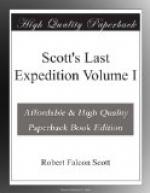I’m afraid we can place but little reliance on our dog teams and reflect ruefully on the misplaced confidence with which I regarded the provision of our transport. Well, one must suffer for errors of judgment.
This afternoon Wilson held a post-mortem on the dog; he could find no sufficient cause of death. This is the third animal that has died at winter quarters without apparent cause. Wilson, who is nettled, proposes to examine the brain of this animal to-morrow.
Went up the Ramp this morning. There was light enough to see our camp, and it looked homely, as it does from all sides. Somehow we loom larger here than at Cape Armitage. We seem to be more significant. It must be from contrast of size; the larger hills tend to dwarf the petty human element.
To-night the wind has gone back to the north and is now blowing fresh.
This sudden and continued complete change of direction is new to our experience.
Oates has just given us an excellent little lecture on the management of horses.
He explained his plan of feeding our animals ‘soft’ during the winter, and hardening them up during the spring. He pointed out that the horse’s natural food being grass and hay, he would naturally employ a great number of hours in the day filling a stomach of small capacity with food from which he could derive only a small percentage of nutriment.
Hence it is desirable to feed horses often and light. His present routine is as follows:
Morning.—Chaff.
Noon, after exercise.—Snow. Chaff and either oats or oil-cake alternate days.
Evening, 5 P.M.—Snow. Hot bran mash with oil-cake or boiled oats and chaff; finally a small quantity of hay. This sort of food should be causing the animals to put on flesh, but is not preparing them for work. In October he proposes to give ‘hard’ food, all cold, and to increase the exercising hours.
As concerning the food we possess he thinks:
The chaff made of young wheat and hay is doubtful; there does not seem to be any grain with it—and would farmers cut young wheat? There does not seem to be any ‘fat’ in this food, but it is very well for ordinary winter purposes.
N.B.—It seems to me this ought to be inquired into. Bran much discussed, but good because it causes horses to chew the oats with which mixed.
Oil-cake, greasy, producing energy—excellent for horses to work on.
Oats, of which we have two qualities, also very good working food—our white quality much better than the brown.
Our trainer went on to explain the value of training horses, of getting them ‘balanced’ to pull with less effort. He owns it is very difficult when one is walking horses only for exercise, but thinks something can be done by walking them fast and occasionally making them step backwards.
Oates referred to the deeds that had been done with horses by foreigners in shows and with polo ponies by Englishmen when the animals were trained; it is, he said, a sort of gymnastic training.




